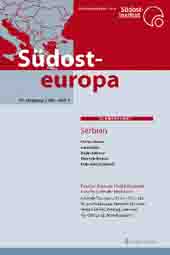Serbien zwischen Europa und Kosovo.
Politische Entwicklungen
seit der Unabhängigkeitserklärung
Serbia Between Europe and Kosovo: Political Developments Since the Declaration of Independenceb
Author(s): Florian BieberSubject(s): Politics / Political Sciences
Published by: De Gruyter Oldenbourg
Summary/Abstract: Abstract. The fall of the Serbian government, following Kosovo’s declaration of independence in February 2008, triggered the fourth parliamentary elections since the end of the Milošević regime in 2000. Serbia continues to struggle with divided democratic parties and a strong nationalist opposition, the Serb Radical Party. As this article will argue, however, Kosovo and nationalist topics did not resonate with voters in the elections. The Democratic Party of Serbia of former Prime Minister Vojislav Koštunica lost a third of their votes since 2007 despite focusing its campaign on retaining Kosovo in Serbia. The continued success of the Radical Party can be explained primarily by the party’s social populism and the disappointment of many voters with their personal economic status. Despite political instability, the election results from May 2008 and the relatively muted Serbian reaction, aside from the protests in Belgrade in February 2008, suggest that the independence of Kosovo has only temporarily delayed the democratization of Serbia and its prospects for EU integration. This article examines the reasons why Serbia, although having at least formally lost a part of its territory in February 2008, did not experience a nationalist mobilization, but rather continued its cooperation with countries that recognized Kosovo. This question will be discussed in the context of the emerging political system in Serbia and the relevance of nationalism as a topic of political discourse.
Journal: Südosteuropa. Zeitschrift für Politik und Gesellschaft
- Issue Year: 2008
- Issue No: 03
- Page Range: 318-335
- Page Count: 18
- Language: German
- Content File-PDF

